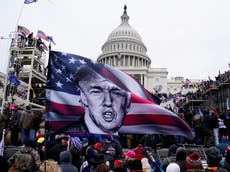US is back in Paris Accords as Biden signs wave of climate executive orders during first hours of office
President Biden’s move is a U-turn on Donald Trump’s decision to exit the international pact to reduce greenhouse gas emissions
Your support helps us to tell the story
From reproductive rights to climate change to Big Tech, The Independent is on the ground when the story is developing. Whether it's investigating the financials of Elon Musk's pro-Trump PAC or producing our latest documentary, 'The A Word', which shines a light on the American women fighting for reproductive rights, we know how important it is to parse out the facts from the messaging.
At such a critical moment in US history, we need reporters on the ground. Your donation allows us to keep sending journalists to speak to both sides of the story.
The Independent is trusted by Americans across the entire political spectrum. And unlike many other quality news outlets, we choose not to lock Americans out of our reporting and analysis with paywalls. We believe quality journalism should be available to everyone, paid for by those who can afford it.
Your support makes all the difference.President Biden rejoined the Paris Climate Agreement on his first day in office, one of a sweep of executive orders to tackle the climate crisis.
Following his swearing-in ceremony as the 46th president, Mr Biden committed to rejoining the international pact to cut the greenhouse gas emissions heating the planet.
It’s a U-turn on Donald Trump’s decision to exit the deal in the first months of his presidential term, after he dubbed the agreement a “disaster” for America.
Rejoining Paris was one of about a dozen executive orders that the newly-minted president signed, the beginning of his administration’s plan to unwind the destructive environmental and climate policies of the Trump era.
Read more: What is the Paris Climate Agreement?
There was also an order to restore 100 public health and environmental rules that former president Trump had rolled back or weakened.
Mr Biden canceled the permit for the Keystone XL oil pipeline and banned new leases in the Arctic National Wildlife Refuge, a pristine landscape which Mr Trump opened to oil and gas drilling
Mr Biden also tackled Mr Trump’s rollbacks on methane emissions, a potent greenhouse gas, and on fuel-economy standards for vehicles with executive orders.
When it comes to the Paris Agreement it is believed that, once the United Nations is notified by letter the US intends to rejoin, it should officially take effect in 30 days.
President Biden also declared that the US is rejoining the World Health Organisation and signed an order prohibiting interference in the operations of the Justice Department from other parts of government.
On the campaign trail Mr Biden had promised to recommit to the Paris Accords, adding that his administration would also push other countries to ramp up their domestic emissions targets.
It’s expected in the coming months, that the US - which accounts for 15 per cent of global emissions - will submit updated reduction targets from the Obama-era goals, in an effort to lead by example
The US had pledged to reduce emission levels between 26-28 per cent by 2025 from 2005 levels. It is not on track to reach those goals.
The core of the Paris agreement is reliant on countries continually ramping up their emissions targets, called “Nationally Determined Contributions”.
Mr Trump’s decision to exit the accords meant that other major emitters have lagged on their goals.
Nations’ current pledges are not enough to achieve staying well below 2 degrees Celsius above preindustrial levels, and pursue efforts of an increasingly ambitious 1.5C, the levels which scientists say will prevent catastrophic heating.
By 1 February, the Biden administration has promised additional executive actions to address the climate crisis.
Further down the line will be the goal of passing a $2 trillion climate package to jumpstart America’s race to net-zero carbon emissions by 2050.
President Biden is expected to convene a summit with leaders from other major polluters in the hopes of ramping up ambitions ahead the UN climate talks, COP26, this November in the UK.
The Paris deal provides pathways for richer countries to help poorer ones, some of which are already bearing the brunt of the climate crisis.
As part of the Paris deal, former president Obama pledged $3 billion toward the Green Climate Fund to help poorer countries adapt. Mr Trump moved to withhold $2bn when he became president. In 2019, 27 countries announced contributions totalling $9.8bn. The US refused to contribute.




Join our commenting forum
Join thought-provoking conversations, follow other Independent readers and see their replies
Comments